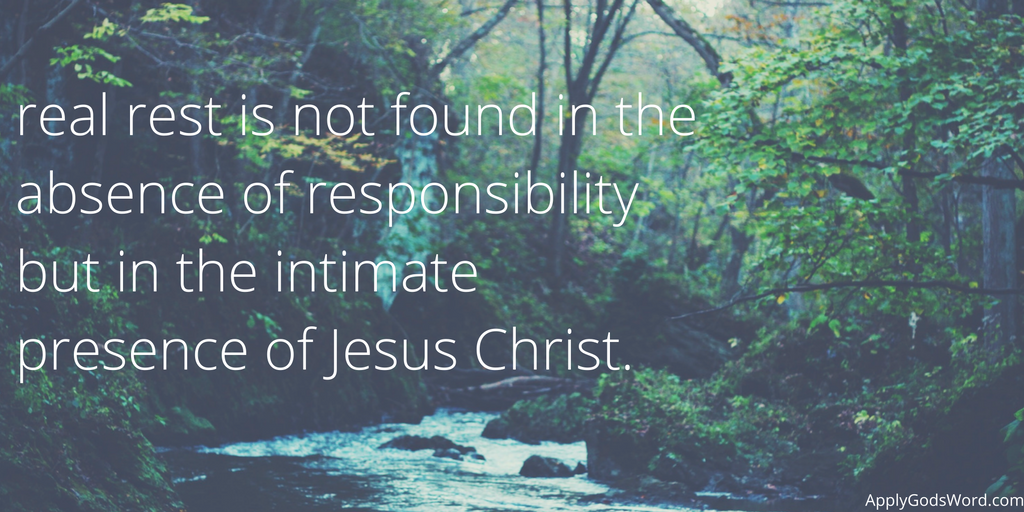
So then, there remains a Sabbath rest for the people of God, for whoever has entered God’s rest has also rested from his works as God did from his.-Hebrews 4:9-10
Have you ever been burned out? Just over done from the grilling flames of the day-to-day grind we all endure? The natural remedy, we think, to being overworked is to get time away from work. Isn’t this one of the main reasons we look forward to the holiday seasons so much?
True rest is not the absence of responsibility; real rest is being in the intimate presence of the Lord. Therefore, if we seek to rejuvenate ourselves simply through the absence of responsibility, this is a quick fix that will not last because it is based in a works theology. We think we can gain our own rest through our actions, or in this case, our lack of actions.
The Sabbath is a big theme throughout the Bible. God rested from his work on the seventh day, the fourth commandment is to keep the Sabbath, Jesus and the Pharisees came to blows over the Sabbath on many occasions as Jesus seemed to intentionally heal people on this day, and to top it all off Jesus said he is actually Lord of the Sabbath (Matthew 12:8). Clearly the Sabbath is a big deal to God. But why?
The Sabbath is such a big deal because it, like all of Scripture, points to Jesus and our need of him (John 5:39). The Hebrews word for Sabbath rest is sabat, which means “to rest or stop or cease from work.” The Sabbath was an Old Testament symbol for the work and person of Jesus. Because of Jesus, we are to rest and stop our efforts to make ourselves right with God (Ephesians 2:8-9).
God rested on the Sabbath day because his work was done. Seven in the Bible is the number for completion. Likewise Jesus sat down at the right hand of the Father after he provided purification for sins not because he was tired, but because his redemption for humanity was completed at the cross and resurrections (Hebrews 1:3). Jesus intentionally healed the sick on the Sabbath to show everyone that people will not get well through resting from their work. They will get well when they come into relationship with him, the Lord of the Sabbath.
Jesus is our rest, our Sabbath, our Seventh Day, the One who heals and restores, the only one who has the right to claim our worship not for just one day but for every day. Jesus said, “Come to me, all you who are weary and burdened, and I will give you rest.” (Matthew 11:28).
Finding our rest in God is for his glory and our good. When God is shown to be the great restorer of souls, he is seen as beautiful. When he restores our souls, we are truly benefited.
So let us seek rest regularly as God intended. But let us not totally contradict the true intention of the biblical Sabbath. Of course clearing our schedules and taking a break from work is not wrong. This is good. But this type of rest will never compare to being healed and filled up by personal intimacy with Jesus. To relieve yourself of responsibility will only result in true rest if you use that time away to be rejuvenated in Christ. Hobbies are not wrong, but they can be if they take Jesus’ place rather than create time to be with him.
Let us seek to clear our schedules and do relaxing things not as a way to gain our own rest, but so our minds can breathe to then be better equipped to hear the voice of God who freely gives us rest through our relationship with him.

If what you are saying is true (and I certainly believe this is the case), why is it that some groups – the Seventh Day Adventists, for example – still insist that we must legalistically keep the Saturday Sabbath? I don’t think most people who believe so even keep all the Sabbath rules according to the Old Testament, anyway, such as not going too far away from home and not gathering wood and stuff. Could you explain their reasoning please? I’m curious.
Great questions. I talk about that in this blog: https://applygodsword.com/the-importance-of-resting-in-god/
I hope that helps a bit,
Mark
Statements made by the Roman Catholic Church about the Sabbath
“Most Christians assume that Sunday is the biblically approved day of worship. The Catholic Church protests that it transferred Christian worship from the biblical Sabbath (Saturday) to Sunday, and that to try to argue that the change was made in the Bible is both dishonest and a denial of Catholic authority. If Protestantism wants to base its teachings only on the Bible, it should worship on Saturday.” — Rome’s Challenge immaculateheart.com/maryonline Dec 2003.
“Is not every Christian obliged to sanctify Sunday and to abstain on that day from unnecessary servile work? Is not the observance of this law among the most prominent of our sacred duties? But you may read the Bible from Genesis to Revelation, and you will not find a single line authorizing the sanctification of Sunday. The Scriptures enforce the religious observance of Saturday, a day which we never sanctify.” — James Cardinal Gibbons, The Faith of Our Fathers (1917 edition), p. 72-73 (16th Edition, p 111; 88th Edition, p. 89).
“For example, nowhere in the Bible do we find that Christ or the Apostles ordered that the Sabbath be changed from Saturday to Sunday. We have the commandment of God given to Moses to keep holy the Sabbath day, that is the 7th day of the week, Saturday. Today most Christians keep Sunday because it has been revealed to us by the [Roman Catholic] church outside the Bible.” — Catholic Virginian, October 3, 1947, p. 9, article “To Tell You the Truth.”
Who Made Sunday Holy?
“Written by the finger of God on two tables of stone, this Divine code (ten commandments) was received from the Almighty by Moses amid the thunders of Mount Sinai…Christ resumed these Commandments in the double precept of charity–love of God and of the neighbour; He proclaimed them as binding under the New Law in Matthew 19 and in the Sermon on the Mount (Matthew 5)…The (Catholic) Church, on the other hand, after changing the day of rest from the Jewish Sabbath, or seventh day of the week, to the first, made the Third Commandment refer to Sunday as the day to be kept holy as the Lord’s Day…He (God) claims one day out of the seven as a memorial to Himself, and this must be kept holy…” — The Catholic Encyclopaedia, vol. 4, “The Ten Commandments”, 1908 edition by Robert Appleton Company; and 1999 Online edition by Kevin Knight, Imprimatur, John M. Farley, Archbishop of New York.
“Question: How prove you that the church had power to command feasts and holydays? “Answer: By the very act of changing the Sabbath into Sunday, which Protestants allow of and therefore they fondly contradict themselves by keeping Sunday strictly, and breaking most other feasts commanded by the same church. “Question: Have you any other way of proving that the church has power to institute festivals of precept? “Answer: Had she not such power, she could not a done that in which all modern religionists agree with her; -she could not have substituted the observance of Sunday the first day of the week, for the observance of Saturday the seventh day of the week, a change for which there is no Scriptural authority.” — Stephen Keenan, A Doctrinal Catechism On the Obedience Due to the Church, 3rd edition, Chapter 2, p. 174 (Imprimatur, John Cardinal McCloskey, Archbishop of New York).
“Perhaps the boldest thing, the most revolutionary change the Church ever did, happened in the first century. The holy day, the Sabbath, was changed from Saturday to Sunday. ‘The day of the Lord’ was chosen, not from any direction noted in the Scriptures, but from the (Catholic) Church’s sense of its own power…People who think that the Scriptures should be the sole authority, should logically become 7th Day Adventists, and keep Saturday holy.” — St. Catherine Church Sentinel, Algonac, Michigan, May 21, 1995.
“Nowhere in the Bible is it stated that worship should be changed from Saturday to Sunday…Now the Church…instituted, by God’s authority, Sunday as the day of worship. This same Church, by the same divine authority, taught the doctrine of Purgatory long before the Bible was made. We have, therefore, the same authority for Purgatory as we have for Sunday.” — Martin J. Scott, Things Catholics Are Asked About, 1927 edition, p. 136.
“Question – Which is the Sabbath day? “Answer – Saturday is the Sabbath day. “Question – Why do we observe Sunday instead of Saturday? “Answer – We observe Sunday instead of Saturday because the Catholic Church, in the Council of Laodicea (A.D. 364), transferred the solemnity from Saturday to Sunday.” — Rev. Peter Geiermann, C.S.S.R., The Convert’s Catechism of Catholic Doctrine, p. 50, 3rd edition, 1957.
“Is Saturday the seventh day according to the Bible and the Ten Commandments? I answer yes. Is Sunday the first day of the week and did the Church change the seventh day – Saturday – for Sunday, the first day? I answer yes. Did Christ change the day’? I answer no!” “Faithfully yours, J. Card. Gibbons.” — James Cardinal Gibbons, Archbishop of Baltimore, Md. (1877-1921), in a signed letter.
“Question. – How prove you that the Church hath power to command feasts and holy days? “Answer. – By the very act of changing Sabbath into Sunday which Protestants allow of; and therefore they fondly contradict themselves, by keeping Sunday strictly, and breaking most other feasts commanded by the same Church. “Question. – How prove you that? “Answer. – Because by keeping Sunday, they acknowledge the Church’s power to ordain feasts, and to command them under sin: and by not keeping the rest by her commanded, they again deny, in fact, the same power.” — An Abridgment of the Christian Doctrine, composed by Henry Tuberville, p. 58.
I am a Seventh-day Adventist Christian. And I keep the seventh-day Sabbath of God as He commanded. The observance of Sunday as the Sabbath was instituted by the Roman Catholic Church in the Council of Laodicea in A.D. 364.
“Perhaps the boldest thing, the most revolutionary change the Church ever did, happened in the first century. The holy day, the Sabbath, was changed from Saturday to Sunday. ‘The day of the Lord’ was chosen, not from any direction noted in the Scriptures, but from the (Catholic) Church’s sense of its own power…People who think that the Scriptures should be the sole authority, should logically become 7th Day Adventists, and keep Saturday holy.” — St. Catherine Church Sentinel, Algonac, Michigan, May 21, 1995.
God instituted His seventh-day Sabbath at creation. Christ and the apostles kept the seventh-day Sabbath.
Luke 4:16 “And he came to Nazareth, where he had been brought up: and, as his custom was, he went into the synagogue on the sabbath day, and stood up for to read.”
Acts 17:2 “And Paul, as his manner was, went in unto them, and three sabbath days reasoned with them out of the scriptures”
Unless you can show me in Scripture where God changed the seventh-day Sabbath to the first day, I will continue to observe the Sabbath of God according to His command and not the commandment of men.